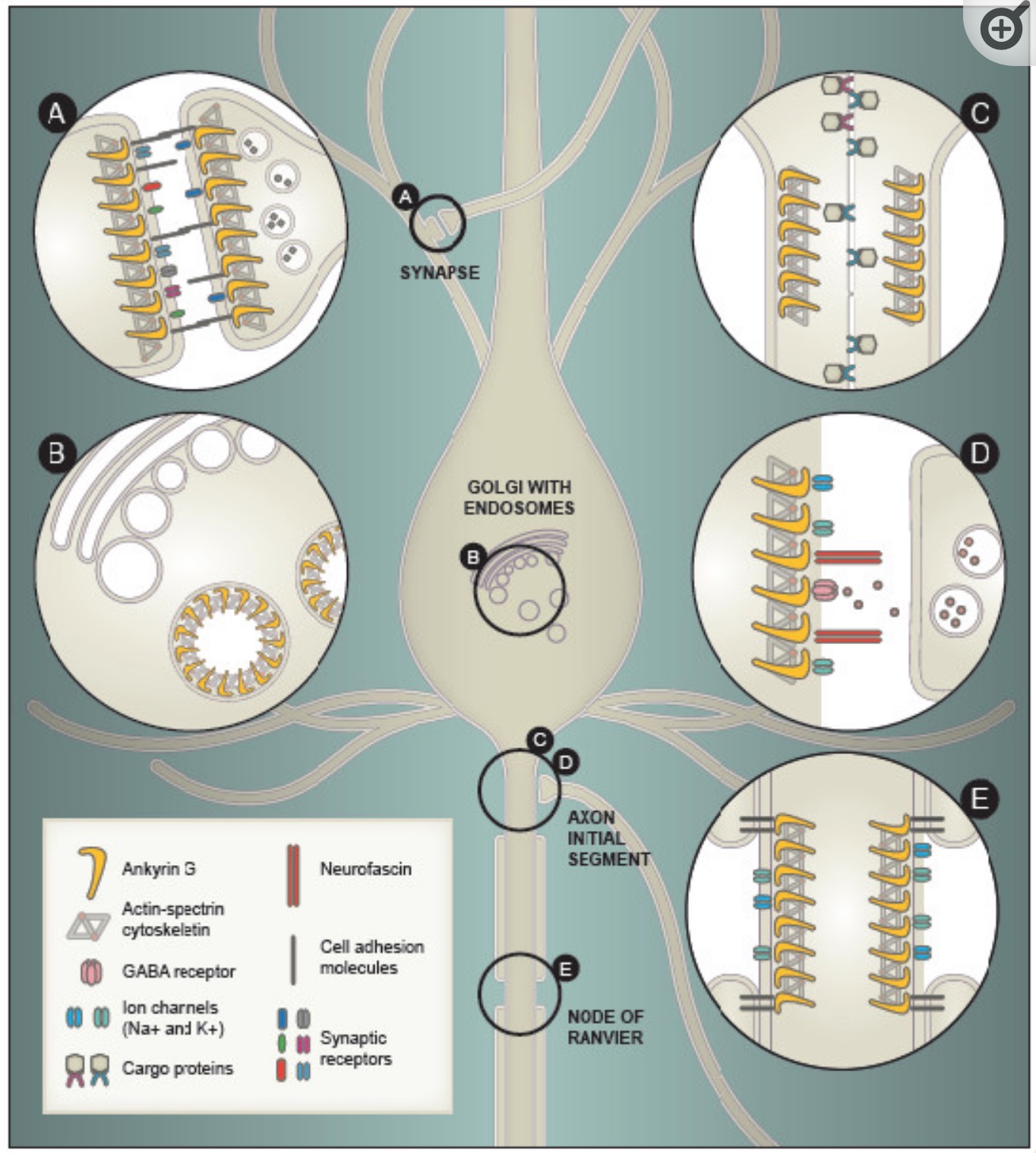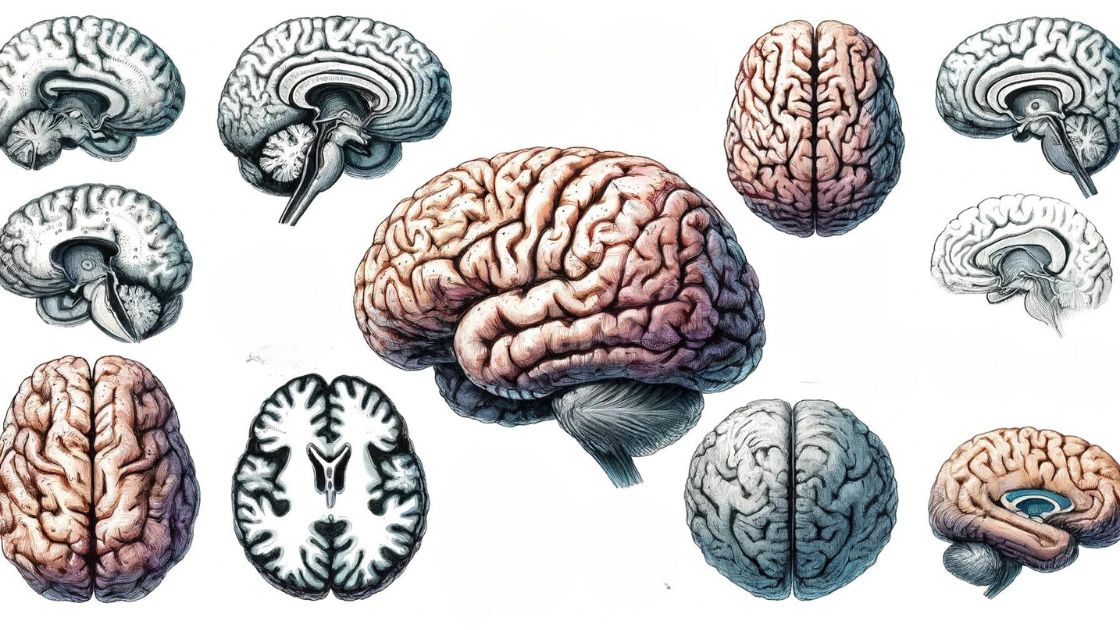The brain is simply amazing – controlling thoughts, movement, essential bodily functions, emotions, mood, and life. At a basic level, all of this brain activity is dependent on electrons flowing through neurons, which is where the ANK3 gene comes in.
I will attempt to explain how ANK3 impacts neuronal formation and transmission – and how this ties into an increased risk of psychiatric disorders. Included also are ANK3 genetic variants to check in your raw data.
As always, the information here is for educational purposes. If you think you have bipolar disorder or schizophrenia, please seek help from a medical professional.
What is ANK3?
Ankyrin 3 (ANK3) is a protein that acts in neurons as a partner, or scaffold, necessary to the voltage-gated sodium channels important in neuronal firing.
Neurons are the brain and nervous system cells that transmit electrical signals — they tell your muscles to move, heart to beat, and brain to think. The impulses sent via neurons are little electrical charges that build up and then ‘fire’.
Along the neuron is a myelin sheath that insulates it, but spaces interrupting the myelin sheath allow ions to flow in. It is where ANK3 comes in — helping the axon structure to initially form and function well. Specifically, it helps to put the sodium channels in the right place.[ref]
Here’s a very quick overview video of how neurons work:
The genetic variants in the ANK3 gene impact the risk of psychiatric disorders that include bipolar disorder and autism spectrum disorders, and heart arrhythmia.
Wiring the brain: AKN3
ANK3 helps wire the brain in two ways:
- ANK3 interacts with the way that neurons transmit signals
- ANK3 is important in neuron formation during fetal development[ref]
There are several different versions, or isoforms, of ANK3, which act in multiple ways in the brain and throughout the nervous system.[ref]
Neuronal firing:
GABAergic neurons are regulated and kept from being overstimulated by GABA, an inhibitory neurotransmitter within the brain. It’s commonly thought of like the brakes that keep neurons from firing too much. It is important in cognitive function, mood, and behavior.
Recent research shows that one form of ANK3 is important in how GABA binds to its receptor (GABARAP) in certain types of neurons. A rare mutation in ANK3 alters this binding and has strong links to causing bipolar disorder.[ref]
Additionally, the ANK3 protein is important in how the neurons fire in certain regions of the brain. The protein helps the way that sodium channels are structured in the axon of the neuron. Sodium channels are essential for changing the ion gradient so that a neuron fires.

You may be wondering how the brain can even work if there is a problem with the neurons firing. There are different types of neurons and specific variations of sodium channels — the ANK3 protein is only important in specific neurons in certain parts of the brain and peripheral nervous system. Variants in ANK3 don’t affect all neurons.
Bipolar disorder and ANK3 variants:
Bipolar disease is reportedly 80% heritable, which means that the genetic component is very high.[ref] But there is not just one gene mutation that causes someone to have bipolar disorder. Instead, many different genetic variants come together to increase susceptibility to this mood disorder.
Executive function refers to the higher-order thinking that people use when making complex decisions or goal-oriented planning. Research shows that people with bipolar disorder are more likely to have executive function deficits, and it is one of the heritable features of bipolar.[ref]
Postmortem studies on the brains of people with bipolar disorder (BD) show that they have lower expression of ANK3. This association indicates that alterations in ANK3 may change how the neurons developed and/or the activity of neurons in specific brain regions, increasing susceptibility to BD.[ref]
Interestingly, new research shows that ANK3 interacts with GSK3B, the target of lithium, a commonly used medication for bipolar disorder.[ref]
Autism Spectrum Disorder:
Rare mutations in ANK3 have been identified in some patients with autism spectrum disorder. Autism is likely to have many different genetic causes, and ANK3 mutations are just one possibility. [ref]
Researchers believe that ANK3 mutations can cause autism or neurodevelopmental disorders by disrupting the proper formation of the axon during fetal development.[ref][ref]
Researchers have found that early stress during the prenatal or early postnatal period alters the interaction of ANK3 in the neuron. Common genetic variants in ANK3, when combined with prenatal stress, are linked to deficits in working memory. In this study, prenatal stress was determined by complications during the pregnancy or birth.[ref]
ANK3 Genotype Report
Members: Log in to see your data below.
Not a member? Join here.
Why is this section is now only for members? Here’s why…
Lifehacks:
Variants in ANK3 physically affect how the brain works.
Animal studies show that lithium works well as a treatment for alterations in the ANK3 pathway.[ref][ref]. If you suspect you have a mood disorder, obviously, talk to your doctor first before trying any supplements. Lithium orotate, a low-dose supplement formula, is available online from supplement suppliers.
Related articles and topics:
Bipolar Disorder, Depression, Circadian Clock Genes
New research shows that depression and bipolar disorder are linked to changes or disruption in circadian genes. Some people carry genetic variants in the circadian genes that make them more susceptible to circadian disruption.
Lithium Orotate + B12: Boosting mood and decreasing anxiety, for some people…
For some people, low-dose, supplemental lithium orotate is a game-changer for mood issues when combined with vitamin B12. But other people may have little to no response. The difference may be in your genes.
Is inflammation causing your depression or anxiety?
Research over the past two decades clearly shows a causal link between increased inflammatory markers and depression. Genetic variants in the inflammatory-related genes can increase the risk of depression and anxiety.
References:
Bi, Cheng, et al. “Mutations of ANK3 Identified by Exome Sequencing Are Associated with Autism Susceptibility.” Human Mutation, vol. 33, no. 12, Dec. 2012, pp. 1635–38. PubMed, https://doi.org/10.1002/humu.22174.
Cassidy, Clifford, et al. “Association of a Risk Allele of ANK3 with Cognitive Performance and Cortical Thickness in Patients with First-Episode Psychosis.” Journal of Psychiatry & Neuroscience: JPN, vol. 39, no. 1, Jan. 2014, pp. 31–39. PubMed, https://doi.org/10.1503/jpn.120242.
Cho, Chul-Hyun, et al. “Association Analysis of ANK3 Variants with Bipolar Disorder in the Korean Population.” Nordic Journal of Psychiatry, vol. 71, no. 4, May 2017, pp. 245–49. PubMed, https://doi.org/10.1080/08039488.2016.1268202.
Garza, Jacob C., et al. “Disruption of the Psychiatric Risk Gene Ankyrin 3 Enhances Microtubule Dynamics through GSK3/CRMP2 Signaling.” Translational Psychiatry, vol. 8, 2018. www.ncbi.nlm.nih.gov, https://doi.org/10.1038/s41398-018-0182-y.
Gottschalk, Michael G., et al. “Lithium Reverses Behavioral and Axonal Transport-Related Changes Associated with ANK3 Bipolar Disorder Gene Disruption.” European Neuropsychopharmacology: The Journal of the European College of Neuropsychopharmacology, vol. 27, no. 3, Mar. 2017, pp. 274–88. PubMed, https://doi.org/10.1016/j.euroneuro.2017.01.001.
Hayashi, A., et al. “Calcium-Dependent Intracellular Signal Pathways in Primary Cultured Adipocytes and ANK3 Gene Variation in Patients with Bipolar Disorder and Healthy Controls.” Molecular Psychiatry, vol. 20, no. 8, Aug. 2015, pp. 931–40. PubMed, https://doi.org/10.1038/mp.2014.104.
Huang, Claire Yu-Mei, and Matthew N. Rasband. “Axon Initial Segments: Structure, Function, and Disease.” Annals of the New York Academy of Sciences, vol. 1420, no. 1, May 2018, pp. 46–61. PubMed Central, https://doi.org/10.1111/nyas.13718.
Hughes, Timothy, Lars Hansson, et al. “A Loss-of-Function Variant in a Minor Isoform of ANK3 Protects Against Bipolar Disorder and Schizophrenia.” Biological Psychiatry, vol. 80, no. 4, Aug. 2016, pp. 323–30. PubMed, https://doi.org/10.1016/j.biopsych.2015.09.021.
Hughes, Timothy, Ida E. Sønderby, et al. “Elevated Expression of a Minor Isoform of ANK3 Is a Risk Factor for Bipolar Disorder.” Translational Psychiatry, vol. 8, Oct. 2018, p. 210. PubMed Central, https://doi.org/10.1038/s41398-018-0175-x.
—. “Elevated Expression of a Minor Isoform of ANK3 Is a Risk Factor for Bipolar Disorder.” Translational Psychiatry, vol. 8, Oct. 2018, p. 210. PubMed Central, https://doi.org/10.1038/s41398-018-0175-x.
Kloth, Katja, et al. “ANK3 Related Neurodevelopmental Disorders: Expanding the Spectrum of Heterozygous Loss-of-Function Variants.” Neurogenetics, vol. 22, no. 4, 2021, p. 263. www.ncbi.nlm.nih.gov, https://doi.org/10.1007/s10048-021-00655-4.
Leussis, Melanie P., Jon M. Madison, et al. “Ankyrin 3: Genetic Association with Bipolar Disorder and Relevance to Disease Pathophysiology.” Biology of Mood & Anxiety Disorders, vol. 2, 2012, p. 18. www.ncbi.nlm.nih.gov, https://doi.org/10.1186/2045-5380-2-18.
Leussis, Melanie P., Erin M. Berry-Scott, et al. “The ANK3 Bipolar Disorder Gene Regulates Psychiatric-Related Behaviors That Are Modulated by Lithium and Stress.” Biological Psychiatry, vol. 73, no. 7, Apr. 2013, pp. 683–90. PubMed, https://doi.org/10.1016/j.biopsych.2012.10.016.
Luoni, A., et al. “Ankyrin-3 as a Molecular Marker of Early-Life Stress and Vulnerability to Psychiatric Disorders.” Translational Psychiatry, vol. 6, no. 11, Nov. 2016, p. e943. www.ncbi.nlm.nih.gov, https://doi.org/10.1038/tp.2016.211.
—. “Ankyrin-3 as a Molecular Marker of Early-Life Stress and Vulnerability to Psychiatric Disorders.” Translational Psychiatry, vol. 6, no. 11, Nov. 2016, p. e943. www.ncbi.nlm.nih.gov, https://doi.org/10.1038/tp.2016.211.
MAITI, RITUPARNA. Effect of Regulated Add -on Sodium Chloride Intake on Stabilization of Serum Lithium Concentration in Bipolar Disorder: A Randomized Controlled Trial. Clinical trial registration, NCT04222816, clinicaltrials.gov, 23 July 2021. clinicaltrials.gov, https://clinicaltrials.gov/ct2/show/NCT04222816.
McGuffin, Peter, et al. “The Heritability of Bipolar Affective Disorder and the Genetic Relationship to Unipolar Depression.” Archives of General Psychiatry, vol. 60, no. 5, May 2003, pp. 497–502. PubMed, https://doi.org/10.1001/archpsyc.60.5.497.
Nelson, A. D., et al. “Ankyrin-G Regulates Forebrain Connectivity and Network Synchronization via Interaction with GABARAP.” Molecular Psychiatry, vol. 25, no. 11, Nov. 2020, p. 2800. www.ncbi.nlm.nih.gov, https://doi.org/10.1038/s41380-018-0308-x.
Nie, Fayi, et al. “Genetic Analysis of SNPs in CACNA1C and ANK3 Gene with Schizophrenia: A Comprehensive Meta-Analysis.” American Journal of Medical Genetics. Part B, Neuropsychiatric Genetics: The Official Publication of the International Society of Psychiatric Genetics, vol. 168, no. 8, Dec. 2015, pp. 637–48. PubMed, https://doi.org/10.1002/ajmg.b.32348.
Ota, Miho, et al. “Effects of Ankyrin 3 Gene Risk Variants on Brain Structures in Patients with Bipolar Disorder and Healthy Subjects.” Psychiatry and Clinical Neurosciences, vol. 70, no. 11, Nov. 2016, pp. 498–506. PubMed, https://doi.org/10.1111/pcn.12431.
Qaswal, Abdallah Barjas. “Lithium Stabilizes the Mood of Bipolar Patients by Depolarizing the Neuronal Membrane Via Quantum Tunneling through the Sodium Channels.” Clinical Psychopharmacology and Neuroscience: The Official Scientific Journal of the Korean College of Neuropsychopharmacology, vol. 18, no. 2, May 2020, pp. 214–18. PubMed, https://doi.org/10.9758/cpn.2020.18.2.214.
Roberts, Rona J., et al. “Effect of Dopamine on Intracellular Sodium: A Common Pathway for Pharmacological Mechanism of Action in Bipolar Illness.” The World Journal of Biological Psychiatry: The Official Journal of the World Federation of Societies of Biological Psychiatry, vol. 11, no. 2 Pt 2, Mar. 2010, pp. 181–87. PubMed, https://doi.org/10.1080/15622970902718774.
Roby, Yang. “ANK3 Gene Polymorphisms and Bipolar Disorder: A Meta-Analysis.” Psychiatric Genetics, vol. 27, no. 6, Dec. 2017, pp. 225–35. PubMed, https://doi.org/10.1097/YPG.0000000000000186.
—. “ANK3 Gene Polymorphisms and Bipolar Disorder: A Meta-Analysis.” Psychiatric Genetics, vol. 27, no. 6, Dec. 2017, pp. 225–35. PubMed, https://doi.org/10.1097/YPG.0000000000000186.
Rueckert, Erroll H., et al. “Cis-Acting Regulation of Brain-Specific ANK3 Gene Expression by a Genetic Variant Associated with Bipolar Disorder.” Molecular Psychiatry, vol. 18, no. 8, Aug. 2013, p. 922. www.ncbi.nlm.nih.gov, https://doi.org/10.1038/mp.2012.104.
Schulze, T. G., et al. “Two Variants in Ankyrin 3 (ANK3) Are Independent Genetic Risk Factors for Bipolar Disorder.” Molecular Psychiatry, vol. 14, no. 5, May 2009, p. 487. www.ncbi.nlm.nih.gov, https://doi.org/10.1038/mp.2008.134.
Tang, Lili, et al. “ANK3 Gene Polymorphism Rs10994336 Influences Executive Functions by Modulating Methylation in Patients With Bipolar Disorder.” Frontiers in Neuroscience, vol. 15, 2021. www.ncbi.nlm.nih.gov, https://doi.org/10.3389/fnins.2021.682873.
—. “ANK3 Gene Polymorphism Rs10994336 Influences Executive Functions by Modulating Methylation in Patients With Bipolar Disorder.” Frontiers in Neuroscience, vol. 15, 2021. www.ncbi.nlm.nih.gov, https://doi.org/10.3389/fnins.2021.682873.
Yang, Rui, et al. “From the Cover: Neurodevelopmental Mutation of Giant Ankyrin-G Disrupts a Core Mechanism for Axon Initial Segment Assembly.” Proceedings of the National Academy of Sciences of the United States of America, vol. 116, no. 39, Sept. 2019, p. 19717. www.ncbi.nlm.nih.gov, https://doi.org/10.1073/pnas.1909989116.
Zhang, Chen, et al. “Genetic Modulation of Working Memory Deficits by Ankyrin 3 Gene in Schizophrenia.” Progress in Neuro-Psychopharmacology & Biological Psychiatry, vol. 50, Apr. 2014, pp. 110–15. PubMed, https://doi.org/10.1016/j.pnpbp.2013.12.010.

